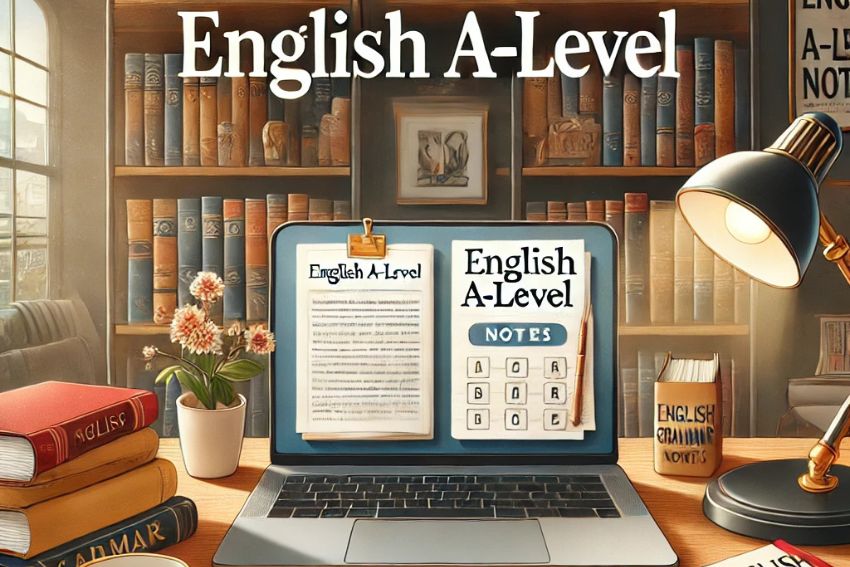Is English Language A-Level Hard? The Ultimate Guide
Is English Language A-Level hard? It’s a question many students ask themselves when deciding their A-Level options-and it’s a concern that parents often share too. If you’ve wondered whether this subject might be too challenging, you’re not alone. English Language A-Level has a reputation for being analytical and demanding, but it’s also known for its unique ability to develop critical skills that extend far beyond the classroom.
This blog is here to answer your questions and ease your concerns. We’ll break down what makes English Language A-Level challenging, highlight its most rewarding aspects, and provide you with tips to tackle the course confidently. Whether you’re considering this A-Level or supporting someone who is, we’re here to guide you through its key content, assessment methods, and proven strategies for success.
Let’s dive in and discover what English Language A-Level is really all about-and why it might be the right choice for you.

An Introduction to English Language A-Level
English Language A-Level is an exciting journey into the depths of how language shapes our world. Unlike GCSE English, which combines literature and language in a broader context, this course takes a more focused approach. Here, you’ll explore linguistic analysis, grammar, context, and the intricate ways we communicate in everyday life.
What sets English Language A-Level apart is its practical emphasis. Rather than analysing novels or poetry, as you might in A-Level English Literature, you’ll investigate real-world language use. If you’re not sure about the difference between the two, our English Language vs English Literature guide explains how each course works in more detail. This could range from studying regional accents to understanding how social media has influenced communication. It’s a subject rooted in the here and now, giving you tools to examine how language evolves and adapts.
Building on the foundations of GCSE English, this course introduces advanced concepts like discourse analysis, sociolinguistics, and language change over time. You’ll also refine skills such as textual analysis, essay writing, and independent research-essential for both exams and coursework.
English Language A-Level isn’t just about studying language; it’s about understanding its power in society. From how we express identity to how we persuade and influence others, this subject opens your eyes to the endless possibilities of words.
English Language A-Level Challenges: What to Know
So, Is English Language A-Level hard? Like any subject, English Language A-Level comes with its own set of challenges. It’s not just about reading and writing; it’s about diving deep into how language works in real-world contexts. For many students, the step up from GCSE can feel significant, but understanding the key areas where difficulties arise can make all the difference.
One of the biggest hurdles is analysing texts and language in depth. You’ll be expected to examine a variety of texts-spoken, written, and digital-and uncover the hidden layers of meaning behind the words. From identifying subtle language features to explaining their impact, this requires a sharp eye for detail.
Another challenge is mastering linguistic theories and terminology. Terms like “phonology” and “morphology” may sound intimidating at first, but they become second nature with consistent practice. Having a strong grasp of these concepts is crucial for both exams and coursework.
Balancing coursework alongside exams can also be demanding. Coursework often involves independent research or creative writing tasks, which need time and focus. Handling these with regular exam preparation means staying organised and managing your time effectively.
Then there’s the need for writing structured, analytical essays. These aren’t just about summarising information-they require clear arguments supported by evidence, all while using precise terminology. Developing this skill takes patience and practice.
Finally, success in A level English Language demands a lot of independent study and self-discipline. Unlike GCSE, where teachers guide you step by step, A-Level expects you to take more responsibility for your learning. Whether it’s revising linguistic theories or refining your coursework, self-motivation is key.
Why Choose English Language A-Level? The Rewards
While many students wonder, “Is English Language A-Level Hard?”, it’s equally important to consider its rewards. Despite the challenges, this subject offers a range of benefits that extend beyond the classroom, making it a worthwhile choice for those willing to put in the effort.
One of the biggest advantages of English Language A-Level is the set of transferable skills you gain. You’ll develop critical thinking abilities as you analyse texts, evaluate arguments, and consider the impact of language in different contexts. These skills are invaluable for higher education, where analytical thinking is often required.
Another rewarding aspect is the improvement in communication skills. By studying how language is used to inform, persuade, and connect, you’ll become more aware of how to use language effectively in your own writing and speech. This is a valuable asset in many professions.
Your ability to conduct textual analysis will also grow. Breaking down complex texts to understand their meaning and purpose is a skill that’s highly sought after in fields like journalism, teaching, and marketing. It’s not just about understanding language-it’s about applying that knowledge in practical, real-world scenarios.
For those comparing subjects, you might ask, “Is A-Level English Literature hard?” While both subjects are challenging, English Language A-Level offers a unique perspective by focusing on everyday communication and its impact. This makes it especially appealing to students interested in understanding the role of language in society and culture.
Ultimately, English Language A-Level isn’t just an academic subject; it’s a stepping stone to a range of exciting career paths. Whether you’re planning to study linguistics at university or explore creative professions, the skills you gain from this course will serve you well in whatever path you choose.
Is English Language A-Level Hard? Course Structure and Content
To understand the difficulty of English Language A-Level, it’s important to look at what the course involves. The structure is designed to develop analytical, creative, and theoretical skills, providing a deeper understanding of how language works in real-life contexts. Here’s an outline of the main components:
Language Analysis
This involves examining spoken, written, and digital texts to explore how they convey meaning and achieve their purpose. For example, you might analyse how advertising language persuades audiences or how social media shapes modern communication.
Linguistic Theories
The course introduces concepts like phonetics (the sounds of language), morphology (word structure), syntax (sentence structure), and semantics (meaning). Understanding these theories helps students decode the mechanics of language. A typical task might involve explaining how these elements work together in everyday texts.
Language Change and Variation
You’ll study how language evolves over time and varies across regions and cultures. This could include exploring historical shifts in English or analysing regional dialects. Questions might ask: “What factors contribute to language change?” or “How does language reflect social identity?”
Coursework
This part of the course allows for independent research or creative writing. Tasks might include crafting an original story or investigating how gender impacts communication. You’ll also write an analysis to explain your choices or findings.
By covering these components, English Language A-Level combines practical analysis with theoretical knowledge. It builds on GCSE skills while introducing advanced concepts, making it both challenging and rewarding for those who engage deeply with the subject. With its focus on language analysis and real-world application, it offers a unique perspective that prepares students for higher education and beyond.

English Language A-Level: Exam and Assessment Format
In English Language A-Level, your grade is typically split between coursework and exams. Understanding how these assessments are structured can make a big difference in how you prepare and succeed. Let’s break it down.
Is English Language A-Level Hard? Coursework vs Exams
The balance between coursework and exams depends on your exam board, but both play a crucial role. Coursework often accounts for a smaller percentage of the final grade but allows for creativity and independent research. For example, you might produce original writing or conduct a language investigation, accompanied by a reflective commentary. Exams, on the other hand, test your ability to analyse texts and apply linguistic theories under timed conditions.
Is English Language A-Level hard? Exam Questions
Exams usually involve analysing unseen texts and answering essay-style questions. For instance, you might be asked to examine how language is used to influence or persuade in a text, or compare how different writers approach the same topic. These questions require a strong grasp of language analysis and the ability to write clearly and logically.
Is English Language A-Level hard? Marking Criteria
To succeed in English Language A-Level exams, it’s essential to meet specific marking criteria. Examiners look for:
- Accurate use of linguistic terminology: Make sure your answers show a clear understanding of key terms.
- Detailed analysis: Go beyond surface-level observations to explain the significance of language choices.
- Structure and clarity: Write your essays in a logical, well-organised manner.
- Evaluation of context: Show how social, cultural, or historical factors influence the language in the text.
By understanding the exam and assessment format, you can approach English Language A-Level with confidence, knowing what to expect and how to prepare effectively. This balance of coursework and exams helps develop both analytical and creative skills, setting you up for success.

Tips For Mastering A Level English Language
After exploring the challenges and rewards of English Language A-Level, it’s natural to ask, “Is English Language A-Level hard? and how can I succeed?” The good news is that with the right strategies, you can manage the workload and perform at your best. Here are some practical tips to help you navigate the course, along with helpful resources to support your learning:
Build a Strong Foundation in Linguistic Terminology
Success in English Language A-Level relies heavily on understanding key terms like “syntax,” “discourse,” and “morphology.” Create flashcards or use apps like Quizlet to memorise these terms, as they’ll appear frequently in both coursework and exams.
Practice English Language A-Level Past Papers
Getting familiar with the exam format is crucial. Familiarizing yourself with the exam format is crucial for A-Level English success. Regular practice with past papers enhances text analysis and essay-writing skills. Below are links to past papers and mark schemes from the four main exam boards:
- AQA A Level English GCSE
- Edexcel A Level English GCSE
- OCR A Level English GCSE
- WJEC A Level English GCSE
Regularly practicing with these past papers will help you become familiar with the exam structure and identify areas for improvement.
Seek Feedback on Coursework
Coursework is your chance to shine, so make the most of it. Share drafts with your teacher or peers and use their feedback to refine your work. Tools like Grammarly can also help improve your grammar and clarity during the writing process.
Stay Organised and Manage Your Time
Balancing coursework, exam preparation, and other commitments requires strong organizational skills. Use planners or digital tools like Trello or Notion to keep track of deadlines and study schedules.
Is English Language A-Level Hard? Additional Helpful Resources
- Online Linguistics Guides: Websites like All About Linguistics can help explain complex linguistic theories.
- YouTube Channels: Channels like Mr Bruff provide detailed video tutorials for A-Level English topics.
- Books: Consider using study guides such as “A/AS Level English Language for AQA Student Book” by Cambridge University Press for comprehensive coverage of the syllabus.
English Language A-Level: Myths vs Reality
When considering Is English Language A-Level hard? it’s important to clear up some common misconceptions that often arise. Many students assume they know what to expect based on their previous experience with GCSE English, but the reality is that this course is much more complex and specialised. Let’s debunk a few myths:
“It’s Just Like GCSE English”
While English Language A-Level builds on GCSE skills, it’s much more advanced. The focus shifts from identifying techniques to analysing how language is shaped by context, culture, and audience, using complex theories.
Is English Language A-Level Hard? -“It’s Easier Than English Literature”
This misconception depends on your strengths. English Literature analyses themes and characters in texts, while English Language A-Level explores linguistic theories and real-world language use. Both are challenging in their own way.
Is English Language A-Level hard? “It’s All About Grammar”
Grammar is just one part of the subject. You’ll also study how language reflects identity, power, and social change, such as how digital media influences communication.
Clarifying Expectations
English Language A-Level isn’t just about rules or surface-level analysis-it’s about exploring how language shapes the world. With its analytical focus and real-world relevance, it’s both challenging and rewarding for dedicated students.

Life After English Language A-Level
Finishing your AS Levels is a big milestone, but it often comes with the question, “What’s next?” Whether you’re deciding to continue with A-Levels, explore other paths, or start preparing for the A2 year, this is a key moment to think about your future.
Continuing with Full A-Levels
If you’ve enjoyed your AS year and want to deepen your understanding, continuing to the full A-Level is a logical next step. The A2 year builds on what you’ve already learned, diving into more advanced topics and refining your skills. For subjects like English Language A-Level, this is where your analytical abilities and understanding of linguistic theories really come to life.
Exploring University Options
Completing full A-Levels opens up a wide range of university courses. For students studying English Language, degrees in linguistics, communication, journalism, and education are natural fits. If you’re wondering how your A-Level choices align with potential careers, university websites and advisors can help you explore your options.
Considering Apprenticeships or Employment
If continuing with A-Levels doesn’t feel like the right path, apprenticeships or direct employment might be worth exploring. Apprenticeships allow you to gain practical skills while working towards a qualification, and they’re available in areas like digital marketing, publishing, or teaching support. For those ready to enter the workforce, your AS Levels can still demonstrate valuable skills like critical thinking and communication.
Is English Language A-Level hard? Future Plans
If you decide to move forward with A2, now is the time to plan. Review your AS Level progress, identify areas to improve, and set clear goals for the upcoming year. Building on your existing knowledge and staying disciplined will make the transition to A2 smoother and more manageable.
Whatever path you choose, remember that AS Levels are just the beginning. Whether you continue with full A-Levels, head to university, or step into the working world, the skills and knowledge you’ve gained so far will serve as a strong foundation for your next adventures.
Conclusion
Is English Language A-Level hard? It can be, but the challenges it presents are matched by its rewards. From mastering linguistic theories to analyzing real-world texts, this course offers a unique opportunity to develop critical thinking, effective communication, and analytical skills that are valuable for both academic and professional success.
With dedication, the right strategies, and a clear understanding of the course structure, success in English Language A-Level is achievable. Whether it’s through building a strong foundation in terminology, practising past papers, or seeking feedback on coursework, there are many ways to navigate the challenges effectively.
For those who might find English Languag challenging, additional help from online A-Level English Language tutors can be incredibly beneficial. They can offer personalised support, help you master complex linguistic theories, improve your writing skills, and guide you through difficult coursework or exam preparation. With expert tutoring, you can gain more confidence and ensure success in the subject.
Ultimately, while English Language A-Level may seem demanding, it’s a subject that empowers you to explore the fascinating ways language shapes the world-and your place in it. With the right approach, it’s a challenge worth taking on.
For more revision tips and notes, visit our A-Level English answers page.
FAQs:
Is English A-Level Hard?
English A-Level can be challenging because it dives deeper into analysis, critical thinking, and theoretical concepts compared to GCSE. Whether it’s English Language A-Level or English Literature A-Level, both require a commitment to understanding complex ideas and presenting well-structured arguments. However, with consistent effort and effective study strategies, success is definitely achievable.
Is English Language Literature A-Level hard?
A-Level English Language and Literature is a combined course that blends aspects of both disciplines. It involves analysing literary texts, exploring language use, and writing essays that require both creative and analytical skills. While it can be demanding, it’s manageable if you enjoy reading, writing, and engaging with how language shapes meaning.
What is the hardest English A-Level?
Determining the “hardest” English A-Level depends on individual strengths and preferences. English Literature requires in-depth literary analysis, while English Language focuses on real-world language use and theories. The combined English Language and Literature A-Level requires balancing both. Each has its own challenges, so the hardest will vary from student to student.
How useful is English Language A-Level?
English Language A-Level is highly useful, offering skills in critical thinking, textual analysis, and effective communication. These skills are transferable to a wide range of careers, such as journalism, teaching, marketing, and law. It also prepares students for further studies in linguistics, media, or related fields.
Is B2 English level good For English A Level?
Yes, B2 English level is considered good. It indicates an upper-intermediate proficiency, meaning you can communicate effectively in most everyday and professional situations. At this level, you can understand complex texts, engage in discussions, and express ideas clearly. While it’s not as advanced as C1, it’s a strong foundation for academic and work-related tasks, and many universities and employers recognise B2 as a satisfactory level of English proficiency.








